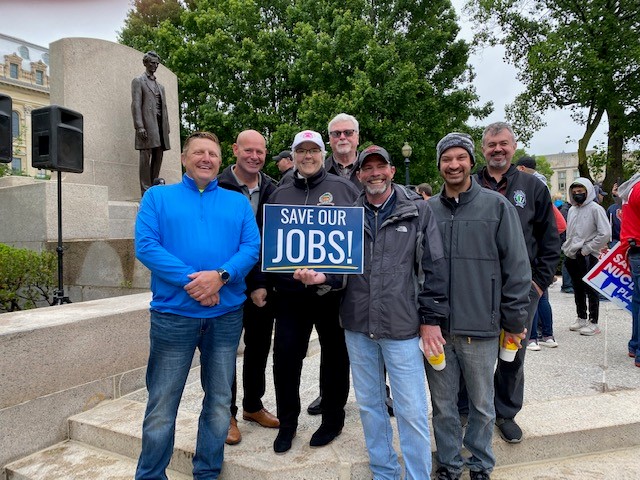
The Illinois locals that are involved are Local 1 St Louis, Local 17 Chicago, Local18 Indianapolis, Local 19 Milwaukee, Local 37 Evansville, and Local 81 Cedar Rapids. The 100% Labor coalition unveiled its package of policy recommendations to transition Illinois to a 100% clean energy economy by 2050. The comprehensive 10-point plan could save or create up to 280,000 jobs, significantly reduce the state’s emissions and help to close the growing income inequality gap in disadvantaged communities that most impacted by climate change.

“This proposal is ambitious but achievable. With the state’s clean energy resources, highly skilled workforce, ready-made apprenticeship programs and manufacturing infrastructure, we can build a cleaner and fairer future while putting working families first,” said Nikki Budzinski, Executive Director of Climate Jobs Illinois.
Climate Change and Global Warming concepts are increasingly gaining strength and popularity. Potentially, this initiative can be compared to the Boston Harbor Project Labor Agreement of 1993 that advanced the nationwide use of construction PLAs for public work. This could offer a public template on how other states address climate change and global warming.
The mechanical insulation industry must capture the opportunity to link the relationship of Climate Change and Global Warming. Climate Jobs Illinois initiative is big enough to gain the attention of the United States and Canada with policy programs such as project labor agreements and government legislation that will enhance and shape the union construction climate landscape. One of the centerpieces of the plan is the Carbon-Free Schools Initiative. CJI is a multifaceted initiative that has many levels all working toward Clean Energy. Here are some of the initiatives that would have an impact for the mechanical insulation industry.
- Requires energy efficiency improvements at all public schools to create or save 67,300 jobs over about eight years. Public school districts currently account for 12 percent of total energy consumption in Illinois.
- Stabilize the current energy portfolio to guarantee adequate baseload availability and promote clean energy generation by keeping Illinois’ nuclear plants open to save 24,000 jobs. This can be achieved by including the Braidwood, Byron, Dresden, and LaSalle nuclear plants in the Zero Emission Standard (ZES) program and adopting the Fixed Resource Requirement process, or a similar process that allows the nuclear fleet to remain competitive in future capacity auctions. Currently, only the Clinton and Quad Cities nuclear plants are included in the and receive zero emission credits (ZECs), which compensate for the environmental benefits of carbon-free energy generation.
- Use the Illinois Works Jobs Program to establish a pipeline into joint apprenticeship programs for workers from disadvantaged communities by properly funding, staffing, and building on the state-approved Illinois Works Jobs Program for the clean energy sector. The program, which was enacted in the 2019 Rebuild Illinois capital program, is a cooperative effort between developers, contractors, unions, nonprofits, and community development agencies to recruit young workers, people of color, women, and other people from disadvantaged communities into joint labor-management apprenticeship programs and lifelong careers in construction.
- To read the CJI’s full 10-point proposal, visit their website.
The CJI has an executive council that is comprised of several labor organizations of the AFL-CIO and Building Trades. The Insulators will be very well represented by an International perspective, Gina Walsh LMCT Deputy Director with an Illinois perspective, William Mangin Business Manager of Local 17.
“CJI is an opportunity to promote the Mechanical Insulation Industry to a broader audience. By joining this initiative, we will be on the front lines in promoting clean energy while at the same time creating new opportunities in employment for our contractors and our members. I am very excited to participate and be a voice for Mechanical Insulation.” Said Insulators LMCT Deputy Director Gina Walsh
The recommendations from Climate Jobs Illinois, which is independent of energy developers and utilities, it is a collaboration of four main sectors: carbon-free power generation, just transition & equity, building efficiency and transportation. CJI’s plan offers a large-scale but practical blueprint for investing in clean-energy infrastructure that simultaneously maximizes emissions reductions to address the climate crisis and create or sustain union jobs and apprentice programs in areas hit hard by the current economic crisis as well as by historic underfunding.
Putting the members of the International Association of Heat and Frost Insulators and Allied Workers to work with the expert union contractors will benefit the Illinois social-economical structure while enhancing the environment. William Mangin, Labor Union Local 17 Business Manager states “This initiative is what is needed for Illinois. I believe this effort can allow the work we do to achieve better recognition and to help reduce energy costs and harmful greenhouse gases. A win-win for all.”
By advocating for bold clean energy investments with comprehensive labor standards, including prevailing wage, apprenticeship requirements, labor peace agreements, project labor agreements and responsible bidder requirements, Climate Jobs Illinois is working to ensure these jobs create more pathways to the middle class, especially for communities disproportionately impacted by the COVID-19 pandemic and climate change.



Comments